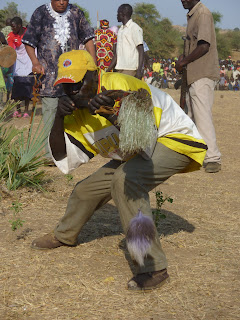It's not exactly an exaggeration to say that working at the hospital consumes the vast majority of my time and energy. Nor is it a far fetched statement to say that this area is slightly lacking in the realm of live entertainment. But, I am a firm believer of making your own fun. So here is a list of some of my new favorite hobbies while living in Gidel.
1. Slaughtering animals
Do not be alarmed, I have not developed a sadistic personality disorder; I am simply embracing the inner Nebraskan farm girl in me. (Although I've never been to that state and I am pretty sure sledding in a cow pasture as a child does not constitute being a farm girl) In any event, killing chickens, goats, and cows is a normal occurrence here and I have become intrigued by it. I was taught step-by-step how to kill a chicken and when it was my turn I failed to complete the task. I had perfect form: my right foot on the wings, my left holding down the legs, its' head in my left hand and I de-plucked neck for optimum slicing, but then the chicken got squirmy. Apparently she was not too happy about having a knife to her jugular. The chicken's movements made me nervous and I lost my cool. So, I ended up handing over the task to a true professional (my ex-pat friend Dora). As of now I am 0-1 for making chicken dinner from scratch.
2. Learning a new language
The primary languages spoken in this area are Arabic and various tribal languages. I am trying to learn Arabic which is by no means an easy task. For example, the word "where" is pronounced exactly like "when." I mean, really? One of the biggest handicaps is not being able to visualize properly what you are trying to say. My usual plan of attack is trying to write the words phonetically in English characters as an aid in memorization. All of the national staff has been really helpful and I have made some progress, but I have a long way to go! So far I have mastered essential sayings such as, "I am going to pee" and "dance party today."
Most of the national staff are from the Tira tribe and they try to teach me that language as well. My American brain cannot learn both Tira and Arabic at once. The only word I confidently use in Tira is diarrhea. I cannot even say "I have diarrhea." Simply just the word diarrhea. I use it in many expected scenarios. If, for example, I have felt sick I will grab my stomach and say "gaucha." or if something smells horrible on the wards I will plug my nose while saying "gaucha.". There are other times, I will admit, I just say it completely out of context; it does roll off the tongue quite nicely. I believe knowing one word instills a belief in my colleagues that I am still trying to learn their tribal language and it is important for them to hear me say it. There is a chance they might catch on a few months from now when my Tira vocabulary has not grown. I am confident my brother would be proud of the word I have chosen to utilize, considering that instead of saying "eeny, meeny, miny, moe" as children to determine the dreaded "it" we recited "ink, stink, poop, fart, out."
3. Food preparation
Let me start off by saying that Sudan is the mecca of sorghum, which means living here is a glutard's paradise. They prepare medida often, which is a sorghum based porridge. (Yes, think Goldielocks) They even make marisa, which is a gluten-free beer. Overall, the food here has been really good. The cooks' staples are beans, rice, and kale. Eggplant pops in sometimes, as well as homemade salsa. Cassava is a popular treat, which is prepared similar to a potato. I have started to become an iron chef myself with the small kerosene burner and help often in preparation of various dishes; although I have had my share of trouble. Often, or perhaps always is a more accurate term, I have been forced to call in reinforcements for the extinguishing of the fire. I spent one afternoon sitting in front of a roaring kerosene torch waiting for a fellow hungry ex-pat to stumble in. They walked in, long after what I had prepared was eaten, to a solitary kerosene burner strategically moved away from all flammable items in the kitchen. They say the wicks were too long; I say we should get an NYFD volunteer for the year. In any event, I was quite grateful (again) to stop inhaling the fumes and now secretly only use the kerosene burner when I know someone is around to put it out.










































